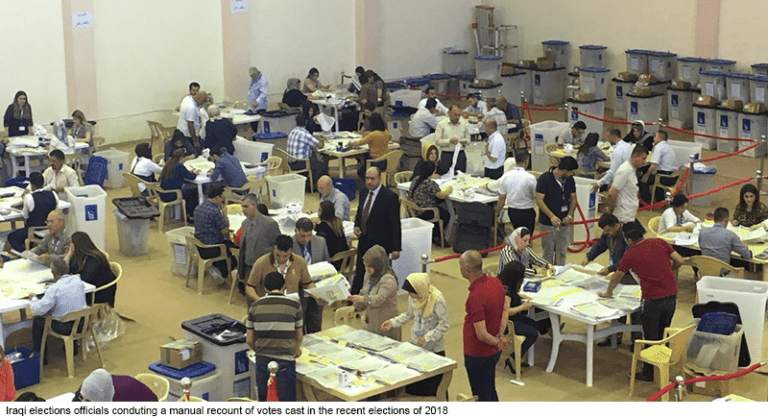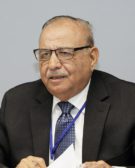
At the end of June, Iraq entered a legislative vacuum following the complications of the May parliamentary elections. This vacuum has cast a shadow on the entire political landscape as well as on the work of the Iraqi state. The government in Baghdad became a caretaker cabinet without executive authority to deal with the broader matters of state, having only limited authority to conduct regular business related to security, health, education, and social services. The Iraqi constitution prohibits the government and the prime minister from conducting serious affairs of state, including those related to the armed forces, in the absence of a fully vested legislative authority. Indeed, even the president of the republic and his vice presidents are also caretaker constitutional officers unable to conduct any official business of high political consequence.
One can thus argue that Iraq today is in a functional political paralysis because of the absence of a constitutionally organized order in two branches of government, the executive and the legislative. This is bound to have serious repercussions on security and development in the country as it continues to face the challenges of instability that began with the American invasion in 2003. Iraq also suffers from Iran’s seemingly unfettered influence as well as the presence of terrorist groups, such as sectarian militias and the so-called Islamic State.
An Unsettled Status Quo
The confusion encumbering political and other affairs in Iraq today is a direct result of the recent parliamentary elections, which had unique characteristics previously unseen. First, the government’s own reporting indicates that the participation rate was a mere 44 percent of Iraqis who updated their electoral records to the new electronic voting system. In other words, the actual rate may indeed be smaller since many did not update or were turned away because of technical problems in the new voting machines. Additionally, a sense of alienation and disgust with Iraq’s political leaders was palpable during the election season because of prevalent corruption, entrenched interests, political malfeasance, and even the formation of extra-legal military organizations.
The prevailing uncertainty in Iraq has increased the concern of Iranian politicians who cannot be sure how future coalitions will be formed and maintained in Baghdad.
Second, there were widespread doubts about the polling process and accusations of cheating and forgery in many electoral districts and polling stations. Even the independent High Election Commission (HEC) was accused of participating in election fraud. In fact, the supposedly accidental fire at a facility storing ballots in Baghdad was blamed on the commission, prompting the government to form an investigative committee to look into the matter.
Third, incumbent representatives, of whom a majority lost their seats, also rejected the election results. The current parliament even dissolved the HEC and demanded a manual recount of 10 percent of ballots—to later demand the rejection of all results entirely. Incumbent Prime Minister Haider al-Abadi also confirmed the reported fraud and asked for investigating the violations, especially that his electoral list came only third in polling.
For these reasons, Iraq’s Supreme Court interfered and took responsibility for conducting a manual recount under the supervision of a specially formed legal apparatus that would look into fraud allegations and ensure proper election results. So far, it has refrained from certifying the results, a situation that will nullify any efforts to form alliances for creating the new government since no list knows its true size in parliament. As things unofficially stand at the moment, Muqtada al-Sadr’s Moving Forward list came in first, followed by the Conquest list of pro-Iran politician and militia leader Hadi al-Amiri, and Prime Minister Abadi’s Victory list took third place.
Such uncertainty has obviously been of concern to Iranian politicians who would like to maintain Tehran’s influence in the country. It is also likely to create a corresponding uncertainty about potential alliances. This was evident in Sadr’s initial coordination with Abadi, which was followed a couple of weeks later by a similar agreement with Amiri—only to swing to a Sadr-Abadi coalition toward the end of June. Such machinations are explained by the pressure applied by the Islamic Revolutionary Guards Corps’ Quds Force’s General Qassem Suleimani, and even by Supreme Leader Ali Khamenei’s son Mojtaba, who is orchestrating the formation of a pan-Shia and pro-Iran coalition.
Any remedy for the prevalent corruption and political malfeasance requires that a nonpartisan and uncorrupt prime minister be installed and assisted by an independent legal structure.
Indeed, Iran’s interference—through its militias under Amiri’s leadership—resulted in his second place win. Amiri’s supporters expected him to receive the nod to form the new government. Externally, Iran is under pressure by the United States to leave Syria, while its Houthi allies in Yemen experience setbacks and Lebanon’s Hezbollah becomes increasingly ostracized. These factors are likely to make Iraq the last arena where Iran may defend its ideology and influence. In addition, the government in Tehran is being challenged by domestic disturbances following the loss of value of the riyal, the national currency, and popular demands to withdraw resources from Syria, Yemen, and Palestine. This points to Iran’s insistence that Amiri takes over the government in Baghdad despite his previous failure as transport minister in Nouri al-Maliki’s second cabinet (2010-2014).
Uncertain Political Environment
Iraq’s current reality illustrates the serious predicaments facing the country’s political future.
- Iraq appears to be heading into a period of utter uncertainty. The confusion that prevailed both before and after the election has demonstrated widespread disrespect for the democratic process and an inclination among political factions to circumvent the moral principles undergirding Iraq’s democracy. Political parties previously assumed to be pillars of the democratic process––such as the Patriotic Union of Kurdistan––have shamelessly participated in electoral fraud while ballot boxes in Baghdad were intentionally set afire to cover up acts of forgery and corruption.
- Abadi’s government was never an effective or efficient cabinet; its caretaker status will only make it weaker and less representative. This will undoubtedly prevent the country from embarking again on its much-needed road to development and from beginning the process of reconstruction, after winning the military campaign against the so-called Islamic State.
- The new premier, regardless of his identity or political affiliation, will most likely become hostage to Muqtada al-Sadr’s moodiness and inexperience. It is also likely that Sadr, as heir to a deep Shia religious identity, will influence Iraqi politics in a more sectarian and ethnic direction, one that will be detrimental to unifying the country.
- Armed Shia militias that have been sanctioned by Abadi’s government as official organs of the state are likely to become a serious challenge to any new prime minister. What will be needed is a serious effort to decommission and disarm these militias before they succeed in completely taking over the government and supplanting its functions.
- Corruption and political malfeasance are expected to remain the order of the day so long as no official mechanism is created to deal with these problems effectively. Any remedy requires that a nonpartisan and uncorrupt prime minister be installed and assisted by an independent legal structure. At this juncture, the monumental task of imposing the rule of law is critical for protecting Iraq’s much-vaunted march toward democracy.

